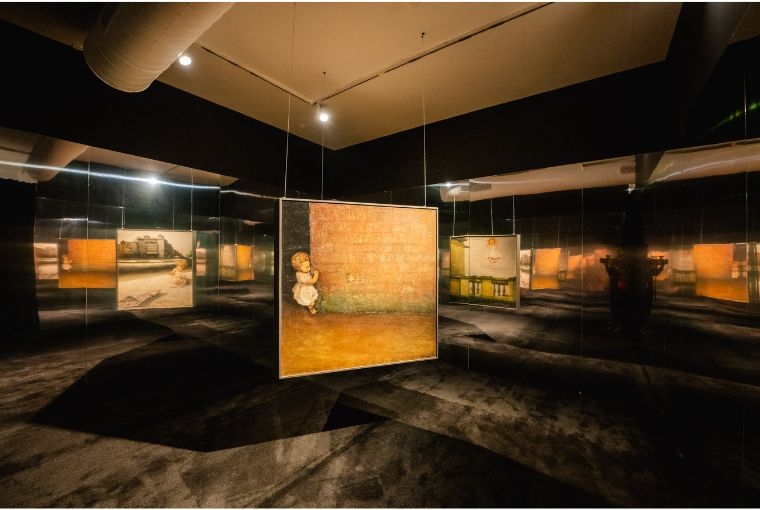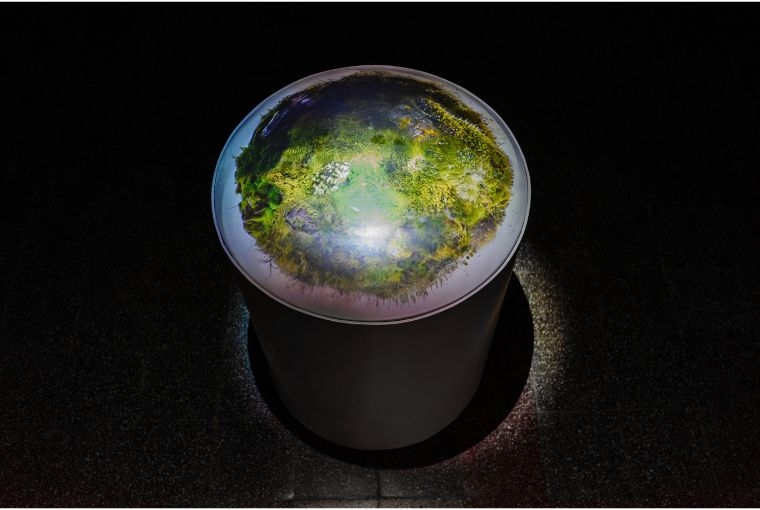
Sheba Chhachhi's multi-part installation

Sheba Chhachhi's multi-part installation

Doll Series by Bikash Bhattacharjee
Curated by Roobina Karode (Director and Chief Curator, KNMA) with Avijna Bhattacharya, Debashree Banerjee, Madhurima Chaudhuri and Agastaya Thapa, the exhibition allows the viewers to engage a wide spectrum of artistic experiences, from drawing, paintings and sculptures to digital presences, AI and computer-generated images and computer coded hyper realities.
“Artworks displayed in this exhibition from the KNMA collection, are being brought to public viewing for the first time. The nature of this exhibition is experiential; in the form of a space-maze, the viewers move through long corridors that open into dark spans and illuminated areas juxtaposing painted images and simulated hyper-realities, beauty and brutality, unregistered presences in photographic images and the poetics of memory and afterlife of performance-based art. It raises provocative questions with no easy or definite answers, asking the viewers to make their own meanings as well. It offers magical encounters with the meticulousness of their craft and enchantment with technology, but most importantly, their creative energies that translate into enduring acts of resilience, quiescence and reflection, and of intimate experiences, alluding to the precariousness of life and our being”, says Roobina Karode, Director and Chief Curator, KNMA.
![Mirror/Maze: Echoes of Song, Space and Spectre Pneuma by Arun Dev [left] | Allegory of Melancholy (After Lucas Cranach the Elder) by Raqib Shaw [right] Mirror/Maze: Echoes of Song, Space and Spectre Pneuma by Arun Dev [left] | Allegory of Melancholy (After Lucas Cranach the Elder) by Raqib Shaw [right]](/uploads_platform/article-image/C760-mirrormaze-echoes-of-song-space-and-spectre-6286.jpg)
Pneuma by Arun Dev [left] | Allegory of Melancholy (After Lucas Cranach the Elder) by Raqib Shaw [right]
One is drawn into the moving narrative around an enduring but difficult relationship (Dayanita Singh and Mona), a life of self-imposed exile and utopian desire (Raqib Shaw), a seeking for resurrecting our lost rhythms with Nature (Jayashree Chakravarty) an awakening to meditative repetitions in music (Sonia Khurana), and re-purposing of domestic utensils of daily use into an object of contemplation (Subodh Gupta). Ranbir Kaleka’s Not Anonymous Waking to the Obscure Fear of a New Dawn, a single channel video projected on six planes defies a single point of reference and highlights an existential crisis in an increasingly hostile world. Raqib Shaw’s unique technique of painting, with enamel and acrylic on birch wood, with intricate detailing using a porcupine quill, creates a dazzling pictoriality addressing the dualities of life, combining the real and the imaginary highlighting alienation, loss and a journey unknown. Sonia Khurana’s double channel video Somnambulist's Song, intersperses the opposing experiences of sound and silence. Anish Kapoor’s huge disk titled (Red no.2 mix to Black Mist) mysterious and precise, real but unreal, full but empty all at the same time, confounds the idea of space and object, and the experience of the aural and the ocular.
The viewers will also get to witness Gauri Gill’s Re-memory, an evocative series with 54 black-and-white photographs that capture unregistered presences, overlooked details of the mundane and urban spaces, without people, indicating absence and a poetics of space. Conversing with Gauri’s black and white photographs, Dhruv Malhotra’s colour pigment print series; Sleepers, After Dark Trilogy draws our attention to the under belly of the city at night, when it is without noise, traffic, people and the chaotic pace of the day. It draws our attention to poignant images of sleepers/ sleeping figures on benches in public spaces such as parks, under the flyover, deserted after-party places and monuments. Rashid Rana’s installation Desperately Seeking Paradise disrupts the idea of a stable reality, creating a maze out of a familiar image of a city’s skyline, playing on optical illusion and deception as we move around the work. Arun Dev’s meticulously painted enigmatic doorways and psychedelic architecture takes us to mysterious or spaces of an alternate world. Nikhil Chopra’s Broken White presents the afterlife of his performance in Paris in 2010, through the accessories, drawings, photographs that create a memory-site within the exhibition space, adding another layer to the performance.

Terrasphere by Rohini Devasher
Martha Fiennes’ extraordinary film Yugen is a combined effort of the artist’s creativity working in sync with the computer coder’s actions, creating constantly evolving labyrinths and taking us through the surreality of time and space to a world that can only be experienced in the realm of art.
Sheba Chhachhi’s multi-part installation Winged Pilgrims: A Chronicle from Asia is a work that has evolved out of years of research, that then translates itself into an assembly of visual images that slow the viewer down in a quiet ambience, to meditate on migration, displacement, impact of globalisation and the unresolved friction between tradition and modernity. In an intimate corner in another space, Rohini Devasher’s Terrasphere, which would demand mindfulness to notice subtle changes occurring in the image-field or the cosmos of the earth. Jayashree Chakravarty‘s hand-made suspended form titled Nest, created out of organic material such as jute rope, coconut fibre, dried leaves, seeds, stained with coffee and tea resonates the interiors of the body or a mind maze, echoing simultaneously the instinctive play of line and mass in nature.
There are works that allude to spectres and apparitions, to human mortality and pain. Bikash Bhattacharya’s motif of the ‘doll’ standing, hanging or abandoned in the deserted city of Calcutta, in the wake of war and violence takes us into an eerie setting of Maria Callas’ a performative adaptation of iconic character such of Desdemona from Othello by Marina AbramovicÌ’s film Seven Deaths Shakespeare or Carmen by Georges Bizet, originally sung by Callas, is a moving rendition on the fate of women in the narratives woven together. Using her body as the medium of her art and expression, Abramovic is recognised for the intensity of her performance-based practice, but also for her grit and risk-taking approach, while testing the limits of her mind and body to transcend fear and mortality.
Words Platform Desk
Date 08.11.2023